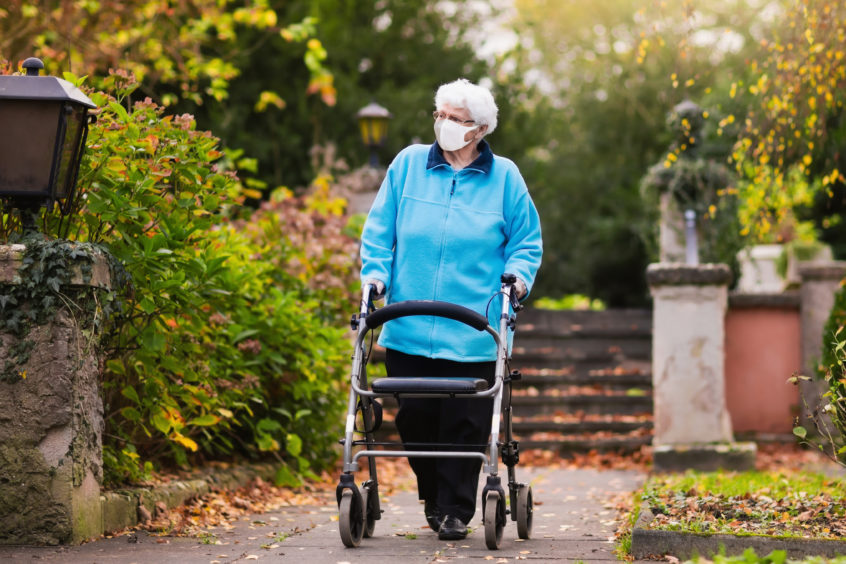
Malnutrition: Scotland’s hidden food issue and how to spot the signs
A dietitian on the Eat Well Age Well project tells us why malnutrition is a worry during lockdown, how to recognise the signs and what to do if you’re concerned about someone.
by Nadia VidinovaFor brilliant recipes, the best of local produce, fresh ideas and insight, subscribe to our weekly Food and Drink Newsletter.
Thank you for signing up to our Food and Drink Newsletter.
Something went wrong - please try again later.
Sign Up
When you read articles or watch programmes about food, you’re probably used to lush images of tasty dishes and discussions about cooking, healthy eating and keeping your weight down.
The topic of malnutrition is rarely on the agenda, except during charity adverts showing emaciated people in poor parts of the world – so you’d be forgiven for thinking it doesn’t happen in Scotland, a country with plentiful food supply.
It is, in fact, a “hidden issue” made worse by lockdown, according to Scottish dietitian Jen Grant, who will be leading a virtual workshop on spotting the signs of malnutrition on June 4 through the Eat Well Age Well project.
In Scotland, the demographic most affected is the elderly, with one in 10 over-65s being malnourished or at risk of being malnourished, amounting to around 103,000 people throughout the country.
And as most of us have at least one elderly relative, neighbour or friend, Jen has agreed to share her expertise and advice on recognising the red flags, how to help the person affected and when to get medical assistance.
“This doesn’t just affect the poor, although money can be a factor”, said Jen.

“Normally when you hear ‘malnutrition’ your brain immediately goes to these adverts you see on TV for charities helping starving children in Africa. However, it’s a bit more complicated than that.
“Malnutrition is actually quite a big concern in Scotland, and it’s something that often goes undetected. It’s a hidden issue. It’s only really in the past few years that health and social care professionals have been taking more notice.
“In Scotland it’s most prevalent in older people, as they are more at risk of being unwell, having limited mobility and difficulty getting to the shops, carrying bags of food and cooking it.
“The current coronavirus situation is a good example of that. There’s all this concern about whether older people should self isolate for 12 weeks, and if you’re an older person whose family lives far away, there is the worry about getting to the shops so a lot of people just aren’t going and are sitting at home with little food.
“There is a concern for older people at the moment – there are schemes and community volunteers offering to do their shopping but a lot of people are very proud and don’t want to ask for help.

“Even when not in a pandemic, older people can struggle, for example when they come home from hospital. They can maybe do some things like walk and go to the toilet so they aren’t seen as being in need of care, but they might have difficulty standing over a hot cooker for ages, so they are limited in what they can eat.
“If they eat the same things all the time, there’s the danger of getting bored of it and eating less, and they also don’t get as wide a variety of nutrients. Poor fitting dentures, difficulty swallowing and living on their own – therefore losing the will to cook varied meals just for themselves – can also put people at risk.
“Malnutrition is actually quite a big concern in Scotland, and it’s something that often goes undetected.
-Dietitian Jen Grant
“Elderly people are disproportionately affected in Scotland but it isn’t just them. With younger people there is usually another health issue behind the malnutrition, for example an eating disorder, a bowel issue, cancer or another serious illness.”
Jen explained that it’s a myth older people naturally lose their appetite and that losing weight in old age is normal.
And even if somebody doesn’t look underweight, if they have lost five per cent of their body weight in the space of three to six months, they could be malnourished despite their BMI being in the ‘normal’ or even the ‘overweight’ range.
“It’s often because you do think of malnourished people as being really thin that some people can go under the radar if they don’t look like that”, added Jen.
“The basic definition of malnutrition is you’re not eating enough to meet your nutritional needs. Most people that this applies to will be underweight, but not all.
“If you have concerns, I wouldn’t say it’s always necessary for the person to be referred to a doctor straight away. A lot of people, if you catch the signs of malnutrition early enough and intervene, that is usually enough.
“If there are bigger concerns or underlying health problems, for example if the person is diabetic or has heart problems, then they should be referred to a doctor, practice nurse or other health professional who can help them with their diet based on their individual circumstances.
“It’s often because you do think of malnourished people as being really thin that some people can go under the radar if they don’t look like that.”
-Jen Grant
“It’s important to catch malnutrition early because when people are malnourished they are more likely to get sick, more likely to fall because of muscle wastage and their recovery from illness or injury is slowed down. They also visit their GP more often, spend more time in hospital and it costs around three times as much to treat a malnourished person as a well malnourished one, so it has a knock-on effect.”
What to look out for
Jen recommends keeping an eye out for the following signs among loved ones, friends and neighbours:
- Weight loss, usually seen when clothes, belts, shoes, jewellery and even glasses seem looser on a person. A wedding ring is a good item to check, because people have those for quite a few years, so if it’s suddenly looser then that could be a sign of weight loss.
- Low energy – if the person seems tired a lot, seems listless and doesn’t want to do much.
- Bruises taking longer to heal or the person getting sick frequently and taking longer and longer to recover, for example a chest infection that lingers on for more than a few weeks.
- Little food in the fridge or cupboards, or a lot of food that hasn’t been touched and is out of date.
- Not finishing meals and leaving a lot of food on the plate.

What to do
- In the first instance, have a chat with the person. Ask them how they’re getting on, what they’re eating, whether they’re able to get out to the shops and how they feel about food.
- If you have concerns about someone not eating enough, encourage them to eat little and often throughout the day, as this stimulates appetite and ensures they get more calories without feeling too full. When people are malnourished they usually lose their appetite so small meals are more manageable.
- Encourage them to get extra calories through snacking, for example by having a slice of cake between meals, or drinking a glass of milk if they don’t fancy solid food.
- Cook for them and bulk out meals with extra calories, for example by adding cheese and having full fat milk, or if you’re having pudding have custard with it.
- Remind them that normal healthy eating advice doesn’t apply. Lots of cheese and milk won’t be good for a well-nourished person because they’re already getting plenty of calories and nutrients. That isn’t the case for a malnourished person.
- If the person’s appetite does come back and they start to put on weight and are no longer malnourished, then they can pull back and stop all these measures to get extra calories.
- Seek medical help if you think the person’s health is in immediate danger or if they have a pre-existing health condition and are malnourished.
To find out more about malnutrition, you can sign up for the Eat Well Age Well training here.
The training is suitable for anyone who cares for an elderly person in the community (not in a care home), whether it’s professionally, through volunteering or if they have caring responsibilities for a relative.

Help support quality local journalism … become a digital subscriber to The Courier
For as little as £5.99 a month you can access all of our content, including Premium articles.
Subscribe
Tags
- diet
- dietitian
- East Well Age Well
- elderly
- food
- food shopping
- healthy eating
- lockdown
- Malnutrition
- nutrients
- nutrition
- older people
- underweight
More from The Courier Food & Drink team

Wine Notes: Our expert urges us to take a closer look at Riesling and Gruner Veltliner varieties
May 29 2020

My Memories in Meals: Gleaneagles chef on how his career took him from Shanghai to London’s banking world
May 29 2020

National Biscuit Day: A look at ten of Scotland’s favourite biscuits
May 29 2020
More from The Courier

JIM SPENCE: Dundee United supporters must rally to give their club a transfer market boost
Premium Content

Dealt-in Murray Davidson reckons Tommy Wright will be a tough act to follow at St Johnstone

Dave Rennie moves on from Glasgow with pride and a little regret

Coronavirus: Chancellor extends support for self-employed but warns of ‘hardship ahead’

Analysis: Chancellor of the Exchequer Rishi Sunak takes his first steps towards an uncertain destination

Coronavirus: What changes have been announced to the furlough scheme and self-employed support?